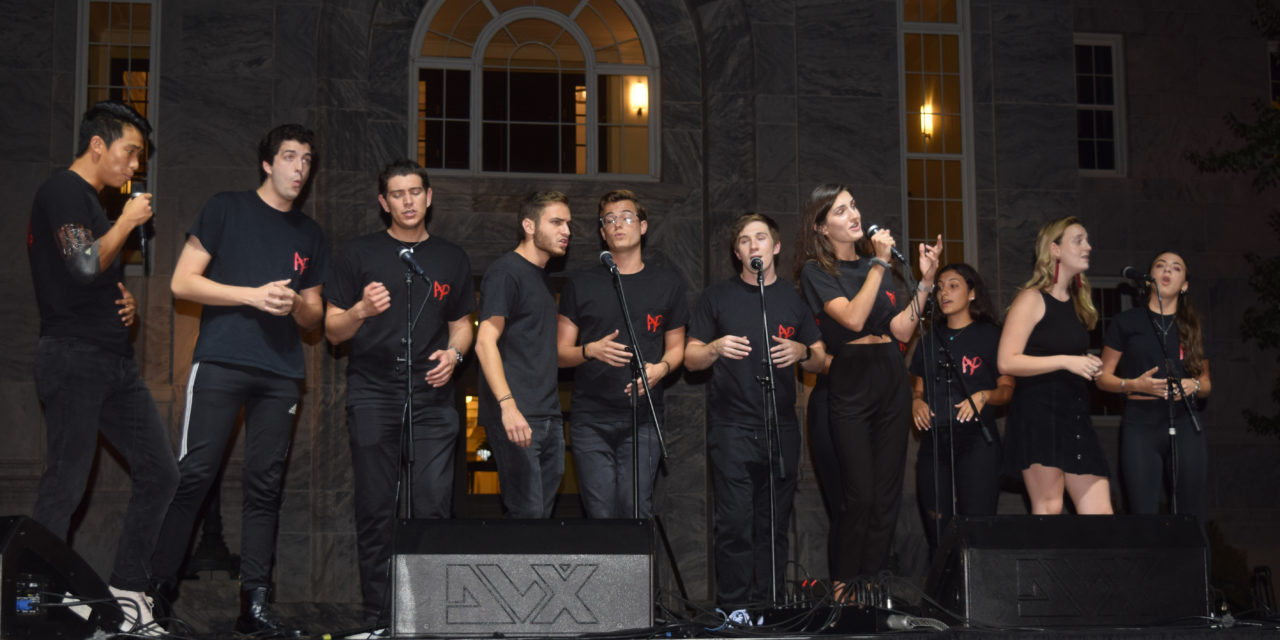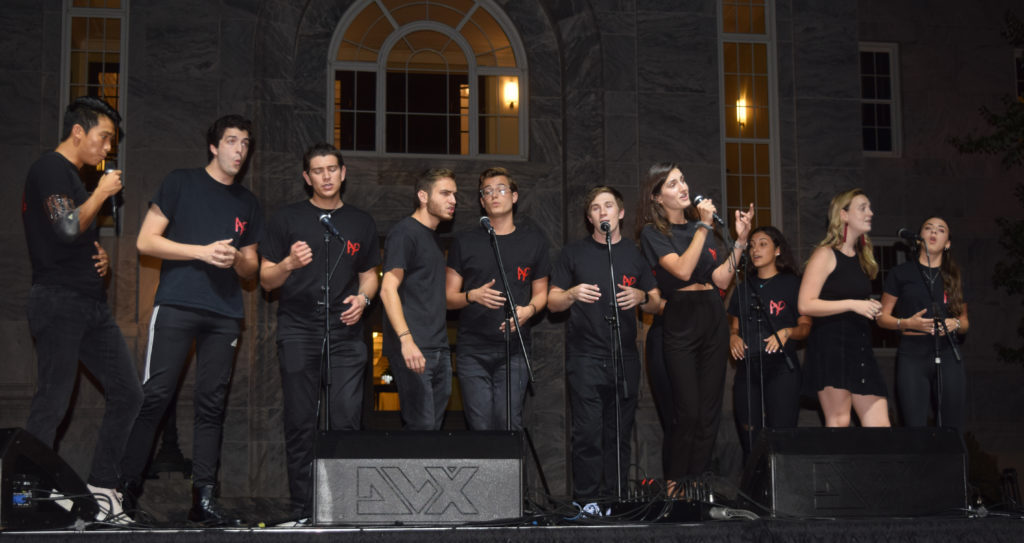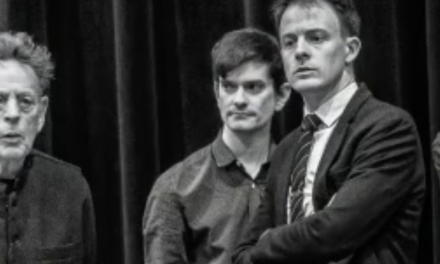Acceptance into one of Emory’s eight a cappella groups is highly selective, and those who audition can find themselves amid an intense process. Singing for a crowd is already intimidating enough — add a group of upperclassmen scrutinizing every note, and Emory a cappella auditions may seem as daunting as being cold called in class when you haven’t completed the reading assignment.
Emory is home to eight a cappella groups who hosted their annual fall auditions on Sept.1 and 2. Groups typically range from nine to 15 people and consist of freshmen to graduate students, according to No Strings Attached (NSA) musical director John Graham (19C). With only a few spots available in each group, the competition is tough, and contestants must deliver top-notch performances.
The Gathering co-president Nivedita Potapragada (19C) told the Wheel the a cappella application process typically involves standard auditions and callbacks, and usually takes place in classrooms at White Hall.
First, the contestant sings a verse and a chorus from a song that they feel shows off their voice, Potapragada said. The first round, which usually lasts between 10 to 15 minutes per contestant, involves several tonal exercises, basic scale reading, pitch matching and sight reading.
All-male group No Strings Attached (NSA) adds a personal element to their auditions by asking contestants about their interests and extracurricular commitments, according to Graham.
Graham said he believes these questions help NSA find the most qualified and friendly members.
“We don’t only see ourselves as an a cappella group, but also a social group and a group of guys who you can go to for advice and academic [help],” Graham said. “People to hang out with on a weekend. Also people with a really good sense of humor.”
After the first round, groups deliberate and determine whom to call back. Callbacks take place either the next day, for groups like AHANA A Cappella, or later in the same day for groups like The Gathering. Contestants who receive a callback join current members to perform a song as a group. Then the current members step back and test the contestants’ collaboration skills by watching them perform together, according to Potapragada.
“We listen to them, their tone blending, how they work as part of the a cappella music that we have,” Potapragada said. “We do that a couple of times, try them out in different pairings and combinations just to see how well they blend with different voices.”
After the second and final round, the groups make decisions and inform the contestants of their fate either through email, phone call or at their doorstep, as in the case of Nicholas Kawanami (22C). No Strings Attached and Aural Pleasure both accepted Kawanami, who auditioned for four a cappella groups total.
“[Aural Pleasure] had everyone hang [out] in their dorm rooms at night, and they showed up to my door and sang one of their songs to let me know that I got in,” Kawanami said.
Because each group has a different genre, style and vibe, each group chooses students that they believe complement their principles. Izzy Gross (20C), PR Chair for AHANA A Cappella, Emory’s multicultural R&B group, said she looks to select newcomers who have an undying adoration of music.
“All of us love making music together and we love randomly singing songs that aren’t even in our book,” Gross said. “We’re an R&B group, so we sing Michael Jackson, Alicia Keys and Boyz II Men. If you have a passion for R&B and a passion for singing, you’re a great fit.”
Meanwhile, Dooley Noted President Ameya Gangal (19C) said musicality is crucial in his group.
“If [a contestant] has a lot of experience in music or they are classically trained or play instruments, that tunes us into what they might be contributing to our group sound and blend,” Gangal said.
All of this may make a cappella auditions sound intimidating, but Kawanami said the audition process was not as scary as expected, noting that “every group was very nice.”
Graham said he understands the anxiety people go through, so NSA tries their best to help newcomers feel comfortable in the audition space.
“A lot of people, especially from international communities, don’t necessarily have an a cappella equivalent, so auditioning here in the U.S. can be a very daunting idea,” Graham said. “If [contestants] forget their words or mess up on a note, we’ll just ask them to start from the beginning so they have the opportunity to show that they can recover from a mistake.”
The best technique, according to Graham, is to be in the moment and show the best side of yourself.
“A cappella groups are looking for people with a lot of personality that have fun when they sing, so don’t just worry about the technique, worry about your performance and how you portray yourself.”
For Kawanami, who said he aims to improve his singing and his presence on campus, being in an a cappella group presents hope.
“A cappella groups are pretty popular here and I’ll be able to experience new things that not every student gets to take part in,” Kawanami said. “[Being in a group will] also push me to be a better singer than I was before.” Kawanami decided to join NSA.
Associate Editor | jweine8@emory.edu | Jesse Weiner (21C) is from Ambler, Pennsylvania, and plans to major in business and history. In addition to the Wheel, he is a trip leader for Outdoor Emory and the housing chair for Delta Tau Delta fraternity. He spends his free time watching movies and debating their merits with the Wheel's film critic, cheering on the Miami Marlins and updating his country music playlist.







